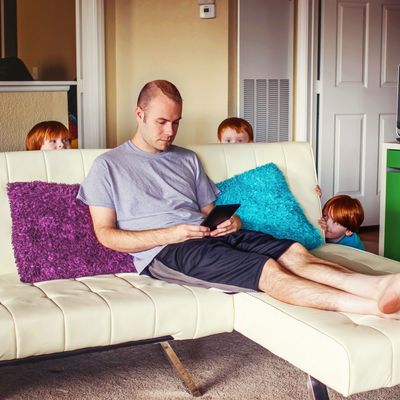
When fantasizing about having a family, millennial men are far more idealistic about the possibilities of egalitarian partnership than previous generations. Yet despite their enlightened attitudes, when they actually have kids, young men are turning out to be pretty traditional dads, serving as the primary breadwinner and shirking from the second shift.
According to the New York Times, the lack of family-friendly policies at work is keeping well-intentioned male millennials from achieving their dish-washing, carpooling, feminist-dad aspirations. Researchers have found that the majority of young men and women say they would like to equally share earning and caregiving responsibilities with their partner. However, when faced with balancing the demands of the workplace and child-rearing, most fall back on traditional, gendered parenting roles.
Research has shown that millennials are far less influenced by traditional notions about gender roles than their forebears: As stated in a study from the Families and Work Institute, only 35 percent of employed, childless young men believe that men should be breadwinners and women should be caregivers. Yet workplace policies and norms have yet to catch up to these shifting ideals. Sarah Thébaud, a sociologist at UC Santa Barbara, told the Times that she believes that while working women benefit from family-work policies, men are still stigmatized for taking advantage of parenting benefits, like paternity leave.
When struggling to balance the demands of work and parenting, men and women often take different approaches. Research shows that women are more likely to take advantage of benefits like paid leave or flexible schedules — and, in the absence of supportive policies, tend to cut back on work. Men, on the other hand, tend to work more. Once they have kids, millennial men are more likely to agree with the idea that fathers should work and mothers should raise kids: 53 percent say it’s better for mothers and fathers to take on traditional parenting roles.
“It’s not that they’ve thrown over their ideals, it’s just that enacting those are much harder given the workplace and cultural structures they’re encountering,” Pamela Stone, a sociologist at Hunter College, told the Times. As a solution, some researchers suggest that policies specifically aimed at men, like rewards for taking paternity leave, could help. Yeah, maybe — but before we start handing out popsicles to men for taking time off work, we might think about making sure women have guaranteed paid (not to mention un-stigmatized) maternity leave.





